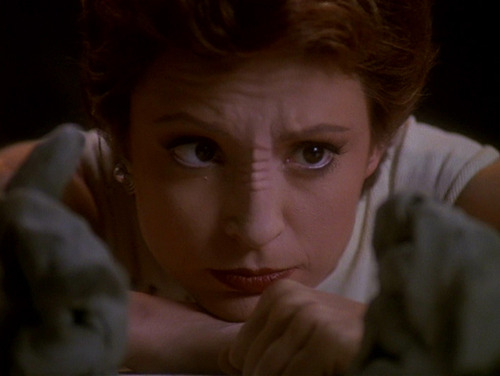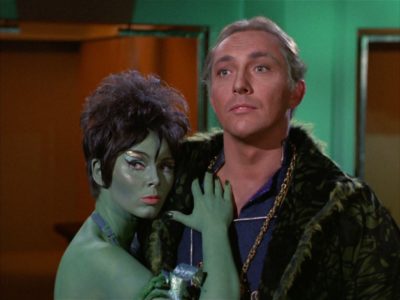When I realized “Accession” was written by the super-talented and amazing Jane Espenson, I was really excited to re-watch and review.
But while I thought the episode was solid, I definitely have stuff to critique. “Accession”‘s A-story has a good concept but is a little heavy-handed. And the B-story is so full of gendered clichés that I don’t think it really does the characters justice.
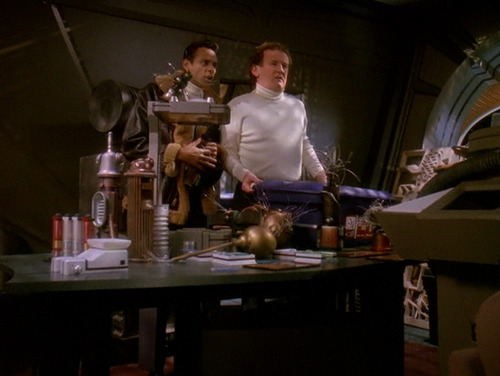
That starts right away in the very first scene, as we see Miles and Bashir having to clean up Miles’ quarters, which has become a dump since Keiko has been away.
Apparently Colm Meaney objected to this scene, saying:
It was expedient to have some sort of what’s considered humor in the script, but I object to saying this man is incapable of keeping his apartment tidy when his wife’s away. That’s a cliché.
Couldn’t agree with you more, Chief. Next, Miles goes to meet Keiko and Molly at the airlock. When Molly lets slip that Keiko is pregnant, Miles’ reaction is mixed to say the least.

Keiko expresses surprise that Miles isn’t happier and he says
But your last visit, you were only here the one night. I thought it’d take a couple of nights. To be honest, a lot more nights.
Oh noes! No more sex for Miles! Miles has the sadz.
If you want to find these scenes funny, you have to at least subconsciously buy into the following stereotypes and myths:
- Men think about sex a lot
- Women, on the other hand, have less need for sex
- Pregnant women automatically can’t have sex (false!)
- For a man, being married takes away from other fun things they want to be doing
And it’s that fourth stereotype that drives the rest of the plot for Miles, Keiko and Julian this episode, as Miles reluctantly and passive-aggressively stays home with Keiko out of a sense of duty rather than heading off for darts or holosuite adventures with Julian.
Yes, Miles’ feelings about this pregnancy wrecking his sex life and his bromance are the focus of his storyline.

Twice he regretfully declines plans with Julian at Quark’s to sulkily go home and be with Keiko and Molly. At one point Miles fails to get Molly to play darts with him at home, and he gazes sadly at his Irish warrior cloak.
So we learn the following about Miles this episode:
- He needs his wife around to keep the house clean
- He feels obligated to be home as much as possible when his wife is pregnant, and is not happy about that
- And he is totally incapable of communicating those feelings to his wife in a constructive way
It’s that last part that irritates me the most. There’s nothing inherently wrong with Miles feeling less than thrilled about having another baby, but when none of the characters can really talk about that it leaves all the stereotypes and clichés unchallenged.
The episode makes it clear that Keiko knows what’s going on; when Miles gazes longingly at his fur cloak we see her look concerned. If she opened a conversation by asking him what’s wrong, the characters and the audience would get to see that the way Miles is feeling and behaving isn’t the way it has to be. He could actually say that he wants, say, one night a week to have his own space. And she could respond rationally and they could work something out that honours both their needs. I know, it’s hard to imagine.

Instead Keiko lets Miles keep his sense of self-sacrifice intact. She tells him Julian has been really depressed without him and she really thinks he should go cheer him up a little. She gives the same message to Bashir about Miles.
She does wink at Miles so it seems that he knows she’s giving him an out, but not addressing it outright allows all those stereotypes about husbands, wives and pregnancy to remain intact.
Like I said, that doesn’t reflect well on Keiko or Miles as characters.
But these parts of the episode are the B-plot. Time to discuss the A-plot, which is significantly better.
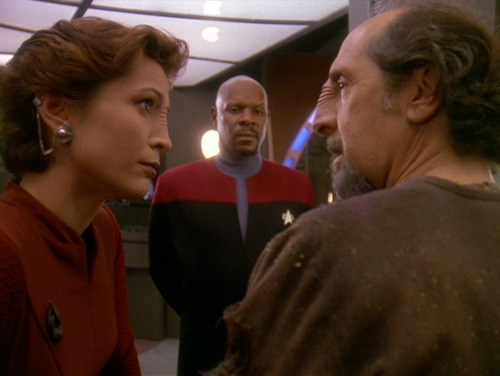
It’s been made clear in previous episodes that Sisko isn’t entirely comfortable being the Emissary. This episode explores that further by presenting him with a choice when a Bajoran shows up to the station claiming to be the real Emissary.
Akorem Laan is a renowned Bajoran poet who is hurled out of the wormhole in an old-timey spaceship after having disappeared over two hundred years before. All these things mean he seems to fit the prophecies as well as Sisko does. Sisko agrees, almost enthusiastically, to step aside.
Side note: Sisko’s conversations with Dax in this episode are a great example of her character acting as a wise counselor to Sisko, both supporting him and prompting him to think things through more.
Odo shares my sense of confusion over how people will explain the fact that they’ve been treating another guy as Emissary for the past several years. Odo asks Kira how she can hold both beliefs at the same time. Kira says it’s no biggie.
Kira: I don’t see it as a contradiction.
Odo: I don’t understand.
Kira: That’s the thing about faith. If you don’t have it, you can’t understand it, and if you do, no explanation is necessary.
This is Kira paraphrasing St. Thomas Aquinas and it’s a powerful statement but I can’t help but feel uneasy that Kira is written as ready to do literally anything the Emissary says, especially when this guy just became the Emissary two days ago and you still work for the old Emissary. I know few people of faith who are that unquestioning.
But the doubts do start to crop up for Kira as the episode goes on and setting her up so strongly at the beginning helps to highlight her internal struggle, plus gives Nana Visitor some great material to work with.
When Akorem finds out how much Bajor has changed since he’s been gone, he decides he has found his purpose: to re-introduce the d’jarra caste system to Bajor, which he says will heal the wounds of the Occupation.
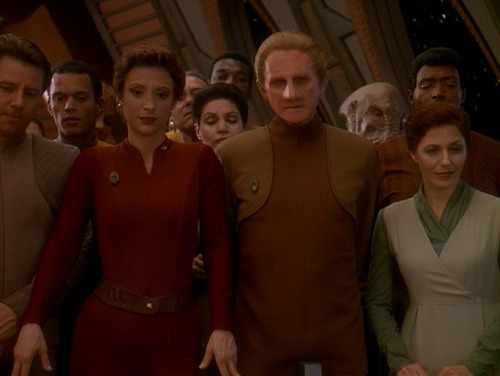
This has direct and uncomfortable implications for Major Kira, who is now respected to return to her family’s d’jarra and become an artist.
Her first encounter with things changing happens in the replimat, where a woman gives up her seat because Kira’s d’jarra is higher. Sisko asks her how she’s feeling about things and her doubts are clearly increasing but she’s still committed to the idea that the Emissary is always right.
Kira: It’s not our place to question the Emissary.
Sisko: No matter what?
Kira: Maybe you never realized this, Captain, but we would’ve tried to do whatever you asked of us when you were Emissary, no matter how difficult it seemed.
Akorem’s policy is giving Sisko a headache, too. He’s now faced with the reality that Bajor’s application to the Federation will not be accepted because the Federation cannot be seen to support caste systems.
Meanwhile, Kira spends an evening trying unsuccessfully to sculpt birds. In the morning she goes to see Vedek Porta for his advice.

Porta says as long as she is clinging to her life in the militia she isn’t giving herself fully to the Prophets.
Though she’s clearly really upset about it, she does decide to resign. I really like this scene for how it shows Sisko’s deep respect and appreciation for Kira.
Kira: I’m planning to move back to the Dahkur province, There are a lot of artists who live in the capital and I have a friend there who’s willing to apprentice me. I’m sorry. The last thing I want to do is add to your problems, but this is something I have to do. If you don’t hit it off with Major Jatarn, I can think of a few other people. It shouldn’t be that hard to find someone to replace me.
Sisko: I don’t doubt I can find someone to fill your post. But to replace you?
Soon, however, the impact of Akorem’s changes gets a lot more serious than just creating a bunch of untalented artists. Odo calls Sisko to the Promenade, where Vedek Porta has murdered a monk for refusing to leave the religious order and go back to his “unclean” d’jarra.

Sisko calls Akorem in but Akorem seems to see the monk’s death as unfortunate collateral damage in his larger plan.
Sisko announces he wishes he’d never given up the role of Emissary and decides they need to consult the Prophets to settle the dispute.
The two take a runabout into the wormhole where the Prophets basically tell Akorem he was only sent as a way of teaching or perhaps motivating Sisko to really realize he is “of Bajor”. They agree to send Akorem back to his own time without any memory of what’s happened.
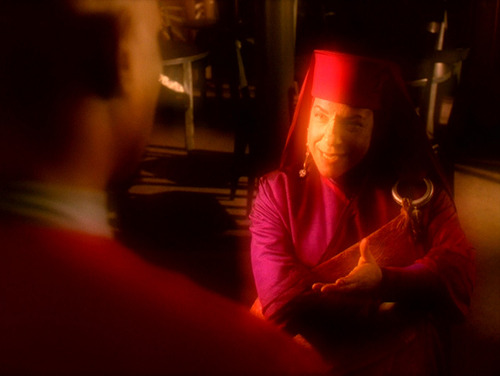
Another side note: Opaka appears in Sisko’s encounters with the Prophets in this episode. It’s Camile Saviola’s last appearance so I just wanted to give it a shout-out.
So apparently Sisko gets back without Akorem but everyone accepts his word of what happened in the wormhole, which I find a little too easy given that less than a day before people were already ready to kill over bringing back the d’jarras.
This result also saves Kira from having to make a final choice. What would she have done if Sisko had either not challenged Akorem or if the Prophets had told Sisko Akorem was right? Would she still have resigned and gone back to Bajor knowing the policy she was following had already resulted in one murder?
I hope not, but we’ll never know, and I think that’s a little unfortunate. I think that issue of asking whether faith really requires never questioning your religious leaders/texts would have been really interesting to explore further, both for Kira as a character and for a modern viewing public dealing with similar conflicts. Luckily we get more of this later in the series as she reacts to the machinations of Kai Winn.
Bechdel-Wallace Test: Fail. Kira talks to two Bajoran women at different times but neither is named.







